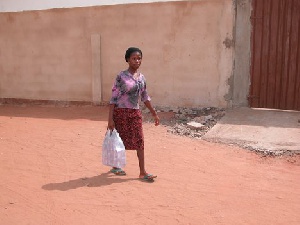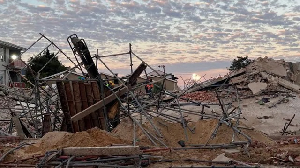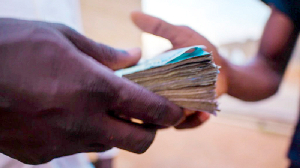- Home - News
- TWI News | TV
- Polls
- Year In Review
- News Archive
- Crime & Punishment
- Politics
- Regional
- Editorial
- Health
- Ghanaians Abroad
- Tabloid
- Africa
- Religion
- Election 2020
- Coronavirus
- News Videos | TV
- Photo Archives
- News Headlines
- Press Release
General News of Wednesday, 23 March 2011
Source: Ghanaian Times
85% ‘pure water’ is not safe
Eight-five per cent of 'pure water' produced in the country does not meet the required safety standards for the health of consumers, a survey conducted by the Ghana Chemical Society (GCS) has revealed.
The study noted that most of the sachet waters are contaminated because producers do not have standard laboratories with allied chemists to ensure safety standards.
Dr Samuel Osafo-Acquaah, a senior lecturer at the Chemistry Department of the Kwame Nkrumah University of Science and Technology and president of the society, urged the Ghana Standards Board, the Food and Drugs Board and other stakeholders to continuously educate and develop programmes for the producers.
He asked the government to source funds for the producers to migrate to the production of bottled water which has better quality and does not pose major health problems.
Dr. Osafo-Acquaah who was responding to questions at a press briefing last Monday in connection with the World Water Day celebration and the International Year of Chemistry which falls on Thursday, said the signs of water-borne diseases are now dawning on Ghanaians with the increase in cholera cases which might be attributed to poor water quality and poor sanitation.
He said the survey further indicated that, in Ghana less than four out of every 10 people had access to clean water, while good sanitation is available to less than two out of every 10 Ghanaians.
The society seeks to promote a better understanding of chemistry and its application in collaboration with industry. It conducts research, consultancy and advocacy, provides important information and scientific data for policy formulation to meet the needs of individuals, industry society and government.
These issues are related to Environmental conservation, the search for alternatives to the use of harmful chemicals in agriculture, industry and health and scientific support and innovations for sustainable development in chemical and allied fields.
Dr. Osafo-Acquaah expressed concern about the recent increase in the price of 500ml sachet water throughout the country from five pesewas to 10 pesewas.
"If we consider that the average person in a day needs about 1.5 litres, about 1,500 ml of water or the equivalent of GH¢15.00 per month and may have to pay about GH¢30.00 for toilet services in a month, then GH¢45.00 for these two services is very high for the average Ghanaian," he noted.
Dr Osafo-Acquaah said that if the amount goes to 20 pesewas it would be prohibitive and innocent children would resort to unhygienic water sources which might eventually lead to diarrhoea cases.
"The society wishes to remind the government that it has the responsibility to ensure the availability of a safe and affordable water to its people as a basic right and water quality and pricing under its jurisdiction," he said.
He observed that there had been efforts by the government and development partners like the Canadian International Development Agency, the Danish Development Agency, the German Agency for Technical Development, Water Aid, and the United Nations Children Fund to achieve some gains but there was a lot more to be done to ensure sustainable safe water delivery and good sanitation in the country.
Dr Osafo-Acquaah said the health of the nation should not be gambled against the profits of a few individual businessmen.
"We believe that manufacturers, consumers and the entire nation will be better served with this arrangement, so that whatever gains the nation has made in the provision of safe water will not be compromised," he said.



![Mohammed Ablorh [L] and Wesley Ayi Bonte [R] Mohammed Ablorh [L] and Wesley Ayi Bonte [R]](https://cdn.ghanaweb.com/imagelib/pics/232/23298154.295.jpg)







